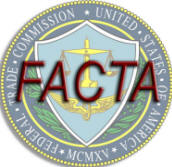 The Fair and Accurate Credit Transactions Act (FACTA) was established in order to protect consumers from identity theft by increasing accuracy, privacy and information sharing. FACTA was passed by the U.S. Congress as an amendment to the Fair Credit Reporting Act (FCRA) on November 22, 2003.
The Fair and Accurate Credit Transactions Act (FACTA) was established in order to protect consumers from identity theft by increasing accuracy, privacy and information sharing. FACTA was passed by the U.S. Congress as an amendment to the Fair Credit Reporting Act (FCRA) on November 22, 2003.
A major reform, FACTA applies to every individual or business that uses consumer information. One of the major components of the law is that it requires all documented information to be securely disposed via shredding or burning. This is intended to ensure the protection of unauthorized use upon information disposal.
Under FACTA, consumers have the ability to obtain a free credit report every 12 months from one of the three credit reporting agencies: Equifax, Experion and Transunion. The agencies have created a website, www.annualcreditreport.com, that gives consumers access to free annual reports.
Before the FACTA amendment, consumers paid up to $9.50 to obtain a copy of their credit reports.
In terms of reducing identity theft, consumers now have the ability to flag their account if they suspect any fraud. The fraud alert is effective for 90 days and can be extended for up to seven years depending upon the circumstance.
In addition, programs that print payment receipts must utilize a personal account number (PAN) transaction, so that a consumer’s account number is not viewable.
FACTA also includes an active duty alert for military members, allowing them to place a notation on their credit report while serving in the military. This component of the law was put into place as a result of the widespread identity theft military members have suffered in the past. Active duty alerts remain on file for a year.
Businesses that fail to comply with FACTA regulations are liable for civil lawsuit damages for any identity theft. Federal violators can face fines of up to $2,500 per violation.
Need a Reprint?
Leave a Reply